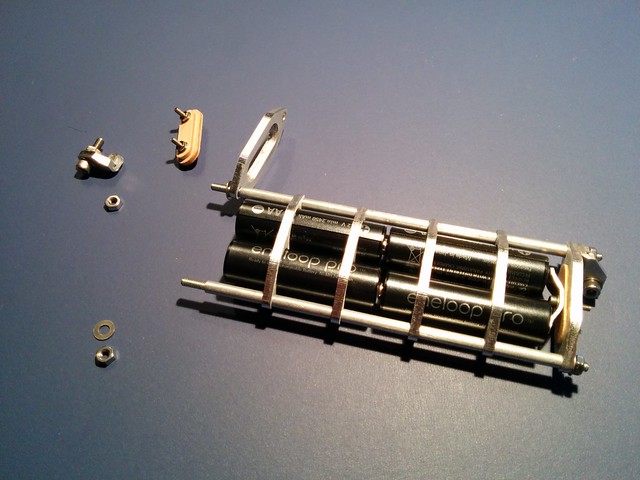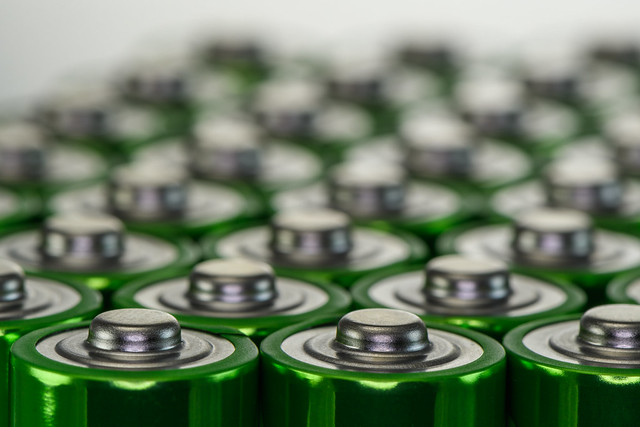AA Lithium Batteries Explanation
Dec 09, 2019 Pageview:1270
Are AA batteries lithium batteries?
The AA batteries are a standardized single cell cylindrical dry battery. They are composed of a single electrochemical cell, which may be a primary disposal cell or a rechargeable one. There are various chemical configurations that are used inside the AA batteries that differ from type to another and from one company to another.
As mentioned before rechargeable AA batteries do exist, and some of these are Lithium-ion rechargeable batteries.
Conventional Lithium-ion batteries operate at a 3.7V per cell. However, AA lithium-ion batteries have circuitry inside their cells so that the voltage is reduced to 1.5 volts instead of 3 volts. Lithium-ion AA batteries have a capacity that matches the highest NiMH batteries capacity, and they are a lot lighter than them. However, they are more expensive than NiMH ones.
There are also other Li-ion AA batteries that are designed for heavy-duty purposes. Like the 18650 and the CR123A.
The 18650 batteries are Lithium-ion rechargeable batteries. The scientific name for them is 18650 cells. They have a 3.7V voltage and have capacities between 1800 mAh and 3500 mAh. The average charge time for the 18650 battery is approximately four hours. The 18650 batteries are larger than the AA batteries. They are used widely in the robotics world.
Most 18650 batteries last between 300 and 500 charge cycles. However, the lifespan of these batteries can be extended beyond those numbers if you charge the batteries regularly before they completely discharge. Since the 18650 battery is a LiPo battery, it will degrade over time, which unfortunately is an irreversible process. With proper usage, you can get over a year or two of life from your battery.
The 18650 is a slightly wider battery than the CR123A though. Most modern LED lights are designed to use a single 18650 Li-ion battery or two CR123A batteries.
What are the best AA lithium batteries?
There a lot of good performance AA Lithium-ion batteries on the market. Here is a list of the best AA Lithium batteries on market in 2019.
Energizer Ultimate Lithium AA batteries
They are a spectacular choice. These batteries are perfect for heavy-duty devices like cameras, flashes, and LED lights. However, beware that these batteries are non-rechargeable lithium batteries.
Duracell Quantum AA batteries
They are the recommended batteries by Consumer Reports. With the best shelf life on a market of 10 years. They come with the Duracell's PowerCheck technology, which allows you to see the remaining power on each battery when you push a button on the battery.
Amazon Basics rechargeable AA batteries
They are a fantastic choice from Amazon. These batteries can be charged up to 1000 times. They are a fantastic choice that offers great value.
Sanyo Eneloop Rechargeable AA batteries
These are amongst the most recommended AA batteries on the market. They last for up to 1500 charge cycles. Moreover, they can retain up to 85% of their capacity even when they are not used for over a year.
Kentli 1.5V rechargeable AA batteries
These are the best AA Lithium batteries on the market, they have more capacity than the Eneloop Pro batteries, a lot lighter, however, they are significantly more expensive. The performance you get from these batteries however makes the few extra bucks worth it.
Could you use AA lithium batteries in anything?
Lithium batteries have many advantages over their counterparts:
They are designed to last longer, for up to four times more than their counterparts.
They are perfect for heavy-duty devices
Lithium batteries can withstand extremely low temperatures.
They are much lighter.
Lithium-ion batteries have built a reputation for itself that no product can overcome, at least for the time being. Lithium-ion batteries have proven to be the best solution for a rechargeable source of energy. Not only that, but nowadays energy can be stored from renewable resources (sun and wind) directly to lithium-ion batteries.
Scientists believe that there is no need to find a replacement for lithium-ion batteries. Instead, all of the current research work is to upgrade those batteries. Since the first lithium battery that was designed in 1970 until this moment, all that was done in the field was upgrading and enhancing the same battery "Lithium-ion battery"
The current researches focus on removing the flammable liquid from inside the lithium-ion batteries. The liquid that can cause those batteries to catch fire. The call the new upgrade a Solid-state battery.
It is also worth mentioning that the Lithium-ion batteries now are the most economical solution for portable energy sources. Their manufacturing prices have become very affordable, that they are the number one choice for every single mobile phone, laptop, and even electric cars manufacturers.
Another reason that makes the Lithium-ion batteries irreplaceable -at least for now- is their size. Storing Lithium-ion batteries in bulk is a simple task. They are compact, small, flexible and versatile. They can be stored easily and hassle-free. Not only that, but their shelf life is phenomenal. One battery can be stored for up to ten years.
All of the above makes the AA lithium batteries a perfect choice for most applications. Here is a list of some of the devices that can operate using AA Lithium batteries:
Digital Cameras and Audio Devices
There is no digital camera today on the market that does not have a lithium-ion battery in it. Either a removable one or embedded one. The usage of Lithium-ion batteries in digital cameras has increased the number of photos that can be taken between every charge dramatically. The same thing goes for Audio devices and recorders, nowadays sound engineers can record and enhance the sound in video conferences and concerts using portable audio devices that can last up to 10 hours of continuous usage.
PDAs
A small version of the Lithium-ion batteries is used in all Personal Digital Assistants (PDAs). That is thanks to the huge development of Li-ion technology during the past decade.
LED Lights
AA Lithium batteries are perfect for high drain heavy-duty devices like LED lights. Some batteries offer up to 7 hours of continuous usage.
- Prev Article: Prolong Lithium Battery Life Methods
- Next Article: Are lithium AA batteries worth it?
Leave Message
Hottest Categories
-
Hottest Industry News
-
Latest Industry News














